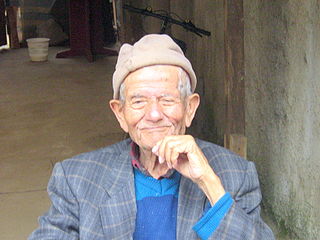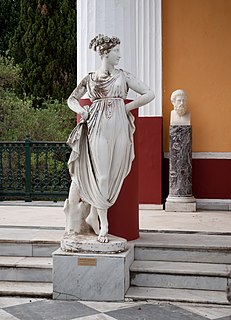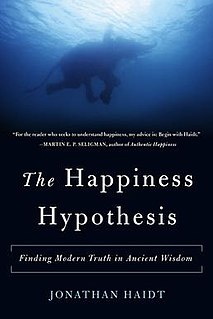 W
WThe term happiness is used in the context of mental or emotional states, including positive or pleasant emotions ranging from contentment to intense joy. It is also used in the context of life satisfaction, subjective well-being, eudaimonia, flourishing and well-being.
 W
WCalmness is the mental state of peace of mind being free from agitation, excitement, or disturbance. It also refers being in a state of serenity, tranquillity, or peace. Calmness can most easily occur for the average person during a state of relaxation, but it can also be found during much more alert and aware states. Some people find that focusing the mind on something external, such as studying, or even internal, such as the breathing, can itself be very calming.
 W
WContentment is an emotional state of satisfaction that can be seen as a mental state, maybe drawn from being at ease in one's situation, body and mind. Colloquially speaking, contentment could be a state of having accepted one's situation and is a milder and more tentative form of happiness.
 W
WEcstasy is a subjective experience of total involvement of the subject, with an object of their awareness. In classical Greek literature it refers to removal of the mind or body "from its normal place of function."
 W
WERG theory is a theory in psychology proposed by Clayton Alderfer.
 W
WEuphoria is the experience of pleasure or excitement and intense feelings of well-being and happiness. Certain natural rewards and social activities, such as aerobic exercise, laughter, listening to or making music and dancing, can induce a state of euphoria. Euphoria is also a symptom of certain neurological or neuropsychiatric disorders, such as mania. Romantic love and components of the human sexual response cycle are also associated with the induction of euphoria. Certain drugs, many of which are addictive, can cause euphoria, which at least partially motivates their recreational use.
 W
WEuphrosyne, in ancient Greek religion; (you-frah-ZIN-ee) and mythology, was one of the Charites, known in ancient Rome as the Gratiae (Graces). She was sometimes called Euthymia (Εὐθυμία) or Eutychia (Εὐτυχία).
 W
WFun is defined by the Oxford English Dictionary as "Light-hearted pleasure, enjoyment, or amusement; boisterous joviality or merrymaking; entertainment". Although particularly associated with recreation and play, it may be encountered during working time.
 W
WGratification is the pleasurable emotional reaction of happiness in response to a fulfillment of a desire or goal. It is also identified as a response stemming from the fulfillment of social needs such as affiliation, socializing, social approval, and mutual recognition.
 W
WHappiness Curriculum is an educational program for children in grades one to eight in schools run by the Government of Delhi since July 2018. The objective is to improve the mental well-being of pupils, and it teaches mindfulness, social-emotional learning, critical thinking, problem solving, and relationship building. Its purpose is to build emotional awareness, to support decision making with that emotional awareness, to equip pupils with the necessary skills and environment to become purpose-driven, and explore a nuanced idea of happiness. The introduction of the curriculum into government schools of Delhi has been called a reformative step towards school education in India.
 W
WThe Happiness Hypothesis: Finding Modern Truth in Ancient Wisdom is a 2006 psychology book written by Jonathan Haidt for a general audience. In it, Haidt poses several "Great Ideas" on happiness espoused by thinkers of the past—Plato, Buddha, Jesus, and others—and examines them in the light of contemporary psychological research, extracting from them any lessons that still apply to our modern lives. Central to the book are the concepts of virtue, happiness, fulfillment, and meaning.
 W
WHappiness in Judaism and Jewish thought is considered an important value, especially in the context of the service of God. A number of Jewish teachings stress the importance of joy, and demonstrate methods of attaining happiness.
 W
WHappy is a 2011 feature documentary film directed, written, and co-produced by Roko Belic. It explores human happiness through interviews with people from all walks of life in 14 different countries, weaving in the newest findings of positive psychology.
 W
WJoie de vivre is a French phrase often used in English to express a cheerful enjoyment of life, an exultation of spirit.
 W
WThe word joy means a feeling of great pleasure and happiness.
 W
WKama means "desire, wish, longing" in Hindu, Buddhist, and Jain literature. Kama often connotes sensual pleasure, sexual desire, and longing both in religious and secular Hindu and Buddhist literature, as well as contemporary Indian literature, but the concept more broadly refers to any desire, wish, passion, longing, pleasure of the senses, desire for, longing to and after, the aesthetic enjoyment of life, affection, or love, enjoyment of love is particularly with or without enjoyment of sexual, sensual and erotic desire, and may be without sexual connotations.
 W
WKimiya-yi Sa'ādat was a book written by Abū Ḥāmid Muḥammad ibn Muḥammad al-Ghazālī, a Persian theologian, philosopher, and prolific Sunni Muslim author regarded as one of the greatest systematic thinkers of Islam. The Kimiya-yi Sa'ādat was written towards the end of his life shortly before 499 AH/1105 AD. During the time before it was written the Muslim world was considered to be in a state of political as well as intellectual unrest. Al-Ghazālī, noted that there were constant disputes about the role of philosophy and scholastic theology, and that Sufis became chastised for their neglect of the ritual obligations of Islam. Upon its release, the Kimiya-yi sa'ādat allowed al-Ghazali to considerably cut the tensions between the scholars and mystics. Kimiya-yi sa'ādat emphasized importance of observing the ritual requirements of Islam, the actions that would lead to salvation, and avoidance of sin. The factor that set the Kimiya-yi sa'ādat apart from other theological works at the time was its mystical emphasis on self-discipline and asceticism.
 W
WLaughter is a physical reaction consisting usually of rhythmical, often audible contractions of the diaphragm and other parts of the respiratory system. It is a response to certain external or internal stimuli. Laughter can arise from such activities as being tickled, or from humorous stories or thoughts. Most commonly, it is considered an auditory expression of a number of positive emotional states, such as joy, mirth, happiness, relief, etc. On some occasions, however, it may be caused by contrary emotional states such as embarrassment, surprise, or confusion such as nervous laughter or courtesy laugh. Age, gender, education, language, and culture are all indicators as to whether a person will experience laughter in a given situation. Some other species of primate show laughter-like vocalizations in response to physical contact such as wrestling, play chasing or tickling.
 W
WBroadly speaking, liberty is the ability to do as one pleases, or a right or immunity enjoyed by prescription or by grant. It is a synonym for the word freedom. In modern politics, liberty is the state of being free within society from control or oppressive restrictions imposed by authority on one's way of life, behaviour, or political views. In philosophy, liberty involves free will as contrasted with determinism. In theology, liberty is freedom from the effects of "sin, spiritual servitude, [or] worldly ties". Sometimes liberty is differentiated from freedom by using the word "freedom" primarily, if not exclusively, to mean the ability to do as one wills and what one has the power to do; and using the word "liberty" to mean the absence of arbitrary restraints, taking into account the rights of all involved. In this sense, the exercise of liberty is subject to capability and limited by the rights of others. Thus liberty entails the responsible use of freedom under the rule of law without depriving anyone else of their freedom. Freedom is more broad in that it represents a total lack of restraint or the unrestrained ability to fulfill one's desires. For example, a person can have the freedom to murder, but not have the liberty to murder, as the latter example deprives others of their right not to be harmed. Liberty can be taken away as a form of punishment. In many countries, people can be deprived of their liberty if they are convicted of criminal acts.
 W
W"Life, Liberty and the pursuit of Happiness" is a well-known phrase in the United States Declaration of Independence. The phrase gives three examples of the unalienable rights which the Declaration says have been given to all humans by their creator, and which governments are created to protect. Like the other principles in the Declaration of Independence, this phrase is not legally binding, but has been widely referenced and seen as an inspiration for the basis of government.
 W
WMaslow's hierarchy of needs is an idea in psychology proposed by Abraham Maslow in his 1943 paper "A theory of Human Motivation" in the journal Psychological Review. Maslow subsequently extended the idea to include his observations of humans' innate curiosity. His theories parallel many other theories of human developmental psychology, some of which focus on describing the stages of growth in humans. He then created a classification system which reflected the universal needs of society as its base and then proceeding to more acquired emotions. His theories, including the hierarchy, may have been influenced by teachings and philosophy of the Blackfeet tribe, where he spent several weeks prior to writing his influential paper.
 W
WThe philosophy of happiness is the philosophical concern with the existence, nature, and attainment of happiness. Some philosophers believe happiness can be understood as the moral goal of life or as an aspect of chance; indeed, in most European languages the term happiness is synonymous with luck. Thus, philosophers usually explicate on happiness as either a state of mind, or a life that goes well for the person leading it. Given the pragmatic concern for the attainment of happiness, research in psychology has guided many modern day philosophers in developing their theories.
 W
WIn psychology, a rush is an acute transcendent state of euphoria. A wide variety of recreational drugs are commonly capable of such an event. These drugs include, but are not limited to, opioids and psychostimulants.